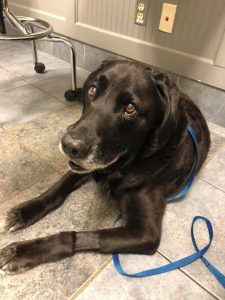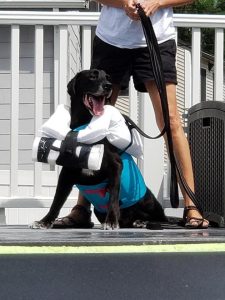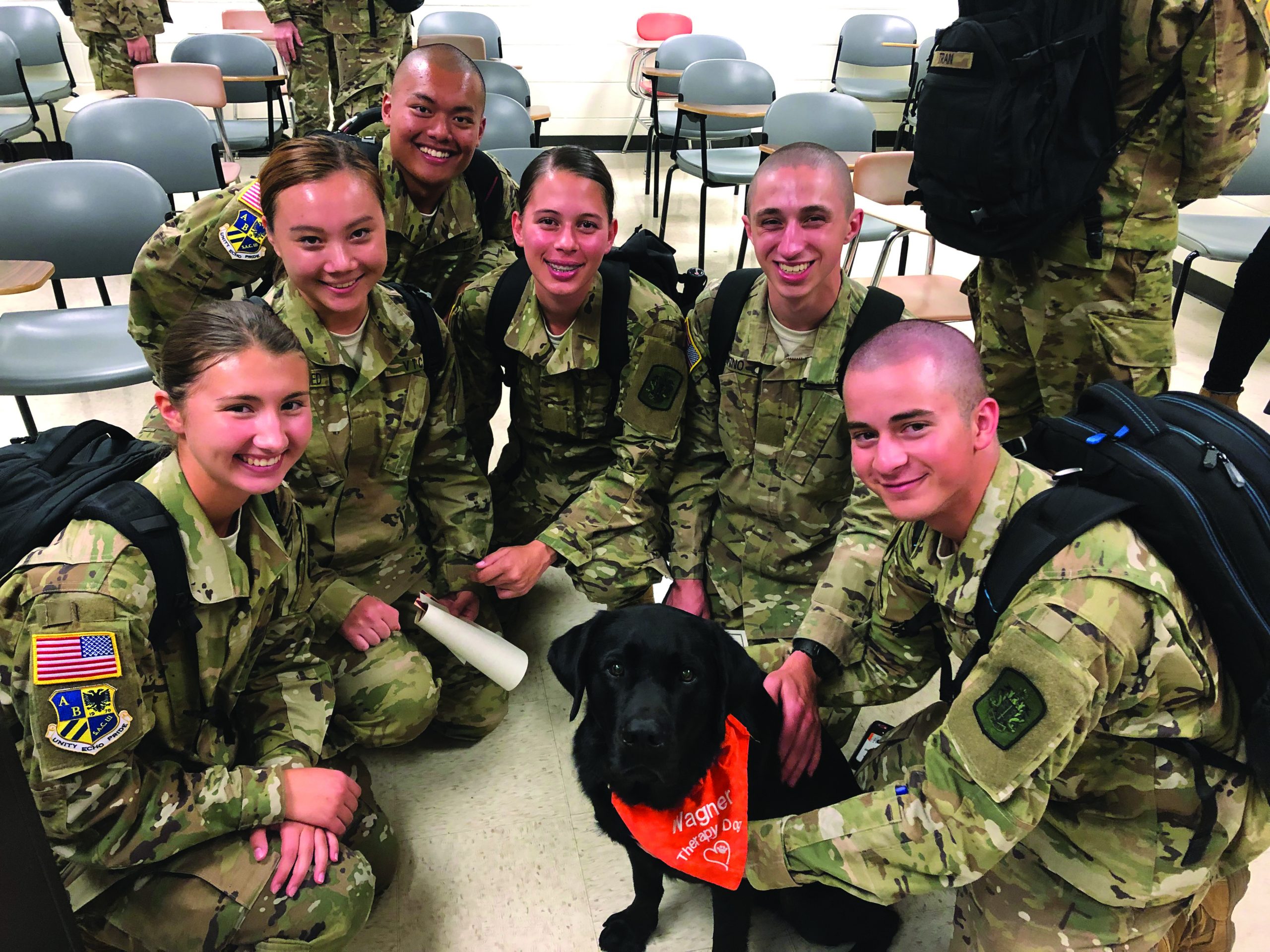The second I heard my big, beautiful, black Lab, Solly, inhale that hot July day last summer, I knew it. There’s no mistaking that raspy sound; he had laryngeal paralysis.
My heart sunk. I couldn’t believe lightning struck twice. A decade earlier, I lost another Lab, Harley, after he bravely fought a long battle with laryngeal paralysis and megaesophagus. And just as we were sobbing our tearful last goodbyes to Harley back then, some of the most monumental research about these mysterious conditions was just being released.
Geriatric Onset Laryngeal Paralysis Polyneuropathy
Laryngeal paralysis, which is when the muscles around a dog’s voice box become paralyzed and cause breathing difficulties, and megaesophagus, which is when the esophagus dilates and causes severe digestive problems, are now linked in a disease called geriatric onset laryngeal paralysis polyneuropathy, or GOLPP. The third component of this condition in senior dogs is hind-end weakness.
“We first noticed the slowly progressing weakness almost incidentally, because we started to do a longitudinal study,” said Dr. Bryden J. Stanley, Emeritus Professor of Surgery at Michigan State University’s College of Veterinary Medicine.
Stanley is one of the foremost researchers of GOLPP, and she even coined the name. Her groundbreaking study opened the eyes of vets and dog owners across the world.
“It’s a little bit like people with Lou Gehrig’s,” Dr. Stanley said. “It’s all a very slowly progressing neurologic disease. It starts with throat clearing and laryngeal dysfunction, then swallowing and neurologic signs come later.”
Dr. Stanley’s research discovered nerves that run to the larynx and the esophagus that go awry, and that’s what leads to problematic symptoms.
GOLPP in Labs
Her team found GOLPP is very common in Labs. “Of all the cases, 69 percent are Labrador retrievers,” Dr. Stanley said. “It is also in other breeds, but mostly in Labs. We don’t know why. We are studying if there’s a gene mutation — or several — associated with the condition in Labs and Newfoundlands, as the two breeds are actually related.”
And after a visit to one of my favorite vets, Solly joined those statistics. The vet confirmed my suspicions that Solly had laryngeal paralysis; however, only a sedated upper-airway exam can confirm that diagnosis for sure. As we observed Solly more, it also became apparent that back-end weakness and muscle-mass loss were setting in. She told me that these symptoms are all linked and now known as GOLPP. I had no idea.
Esophagus Issues
Luckily for Solly, he didn’t have any apparent esophagus issues — but not every dog with GOLPP develops serious symptoms.
“At the time of diagnosis, almost 70 percent of the dogs with laryngeal paralysis had swallowing dysfunction,” Dr. Stanley said her research found.
And swallowing dysfunction doesn’t mean a dog has full-blown megaesophagus; in fact, esophagus function is graded on a scale of zero to five.
- 0 is completely normal
- 1 means the function is pretty good for an old dog
- 2-3 means food is going down to the stomach slowly
- 4 means the esophagus is having a hard time pushing food down to the stomach
- 5 is megaesophagus
Those with the worst esophageal dysfunction also have the highest risk of aspiration pneumonia.
After I got home from the vet with Solly, I researched like mad. I consulted other vets to get opinions about his condition and was surprised to find how many didn’t know about GOLPP.
Tie-back Surgery
A board-certified surgeon eventually confirmed Solly did have laryngeal paralysis. I was hesitant, but at ten years old, Solly had a lot of life left in him, so I decided to give a procedure known as tie-back surgery a go. His medical team sutured back the cartilage on one side of his voice box, and the opening enables him to breathe better.
I’m so glad I had the surgery done. If we hadn’t, we would have risked the paralysis getting to a point where the muscles that control the cartilage around his larynx just stopped working, and Solly would be at risk of suffocating.
“Nearly always, the owners are happy they have the surgery,” Dr. Stanley said. “They have the quality of life back. I have so many emails from owners saying they bought a very valuable few years from doing the surgery. They are no longer in danger of suffocation.” For owners considering having this surgery performed, Dr. Stanley advises, “You need to find a specialist who can do the surgery properly, a Diplomate of the American College of Veterinary Surgeons.”
Physical Therapy
Physical therapy, exercise, and maintaining a healthy weight are also keys to keeping GOLPP dogs going.
Many think swimming is out of the question after tie-back surgery. But I found an incredible design for a specialized life jacket on the MSU GOLPP site that’s designed to keep the dog’s head above water. I made a few adjustments to the life jacket, including making the chin part a bit longer, and now he swims in pools and lakes and goes to swim therapy.
It’s critical to keep them going.
“Physical therapy really helps, strength training, balancing exercising — anything that makes them know where their limbs are,” Dr. Stanley said.
While hearing a vet say “your dog has laryngeal paralysis” for the second time in my life was just as heartbreaking as the first, I’m so glad that time around I had Dr. Stanley’s fantastic research and science to guide me through Solly’s journey.
And as Dr. Stanley reminded me, “It’s not a death sentence. These dogs are typically in their twilight years, and we can significantly improve their quality of life. In their last few years of life, they can be pretty happy.”
Mary Schwager, aka, Watchdog Mary is a TV and print journalist watchdogging for animals. She is honored to have won 16 Emmy, eight Edward R. Murrow and Associated Press awards for investigative reporting and writing. She was nominated for two special category awards by the Dog Writers Association of America. Send her story ideas via watchdogmary.com.








